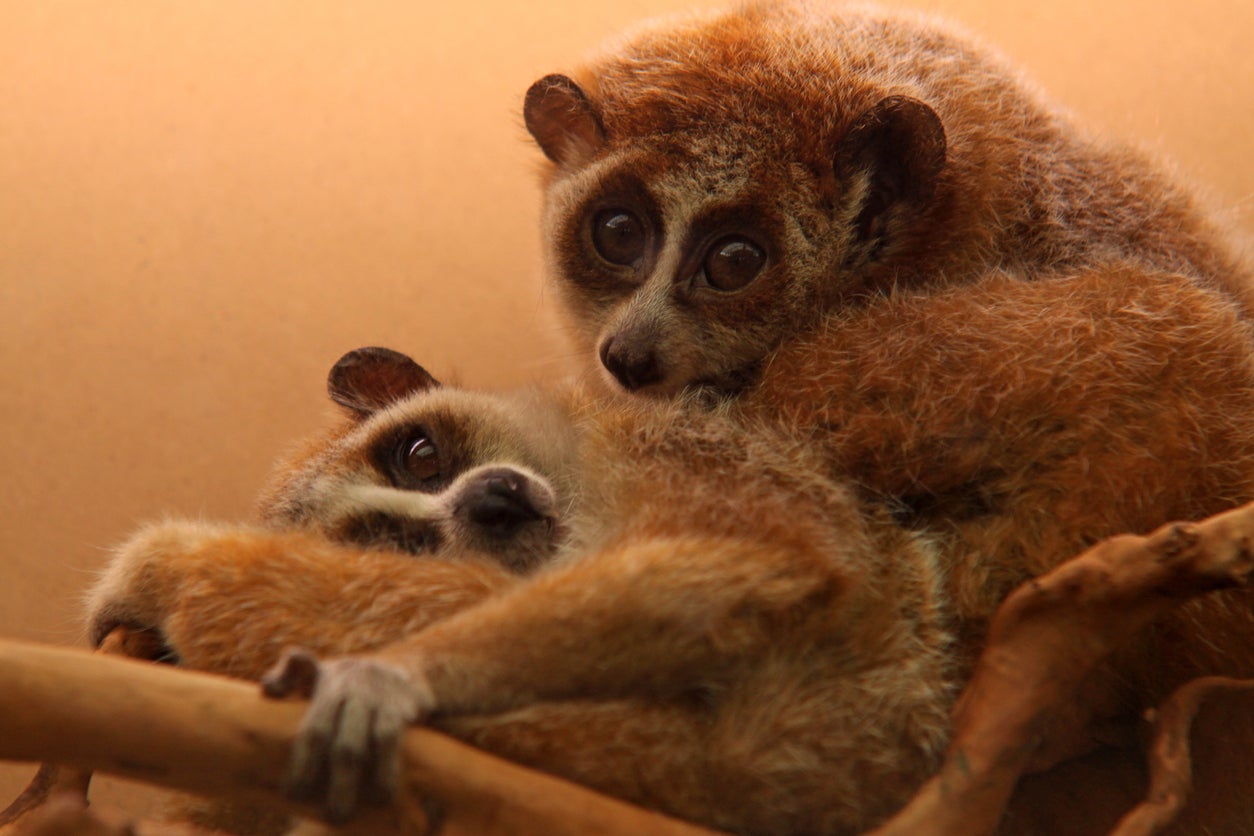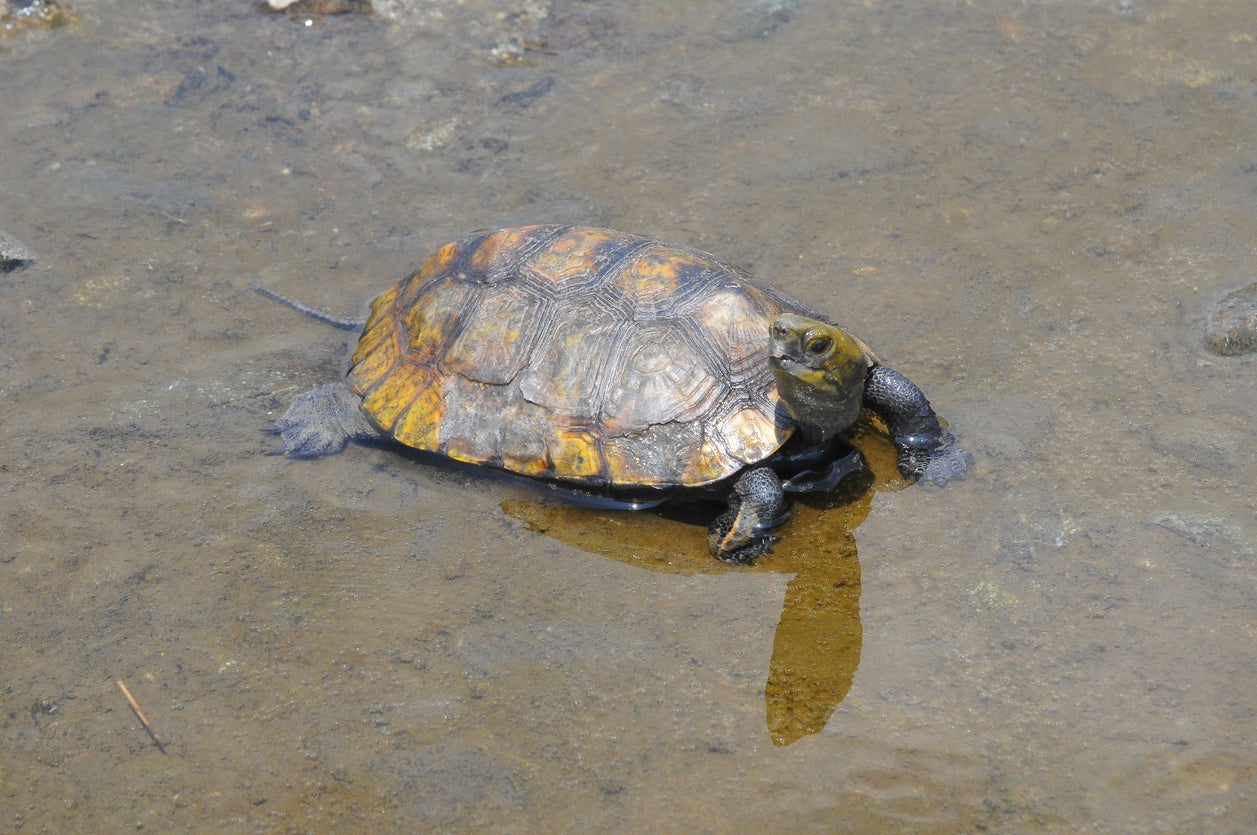Threatened species are ‘laundered’ in Japan’s exotic pet trade, study finds
Stop The Wildlife Trade: Species like slow lorises, owls and pythons are sought for private collections and social media is playing a role in driving demand

Alarming numbers of threatened species are being smuggled into Japan and “laundered” into the exotic pet trade, a new study has found.
The country’s weak legislation and porous borders are not only a boon for traffickers but the flow of species poses a risk of zoonotic diseases that can “jump” from animals to humans, as the coronavirus outbreak has highlighted with devastating effect.
Exotic pet markets also threaten the survival of many wild species and can disrupt native biodiversity by introducing foreign, invasive species.
The Independent’s Stop The Wildlife Trade campaign was launched by its proprietor Evgeny Lebedev to call for an end to high-risk wildlife markets and for an international effort to regulate the illegal trade in wild animals to reduce our risk of future pandemics.
Historically, Japan has been one of the biggest consumers of exotic pets with a demand for hundreds of rare species like slow lorises, owls and pythons for private collections.
There have been booms in demand for “iconic” species driven by the media and social media, researchers noted.
“Historically, exotic pets have received relatively limited comprehensive global policy and law enforcement attention compared with their megafauna counterparts like elephants, rhinos and tiger,” said the researchers from TRAFFIC, an NGO specialising in monitoring the wildlife trade.
The report, published last week, is the first, detailed look at Japan’s exotic pet trade.
"Those smuggling wildlife are risking heavy fines or imprisonment while their actions directly threaten the species concerned and carry with them the very real risk of introducing zoonotic diseases, which as the world knows potentially has dire consequences," TRAFFIC’s Dr Richard Thomas told The Independent.
The study was based on analysis of seizures by Japan Customs, media reports and conviction records, including cases resulting from police investigations after animals had passed through borders.
The researchers noted that their findings represent “only a fraction of actual smuggling into Japan’s domestic exotic pet market”.
Of great concern is the fact that under current Japanese law, most wild animals can be effectively “laundered” into legal, domestic trade if smugglers avoid border controls.
In Japanese law, there are only minimal regulations for nonnative species - those listed in Appendix I of the Convention on International Trade in Endangered Species (CITES).
This accounts for just 931 of the world’s estimated 8.7 million species and focuses on those threatened with extinction, for example, gorillas, sea turtles and giant pandas.
Japan’s own native, endangered species are also being negatively impacted by the international pet trade, the study found.
Between 2007 and 2018, Japan Customs made 78 incoming seizures involving 1,161 animals of species listed in CITES.
There were no more than ten seizures each year over the past 12 years. It is believed that these animals were destined for the exotic pet trade.
Reptiles accounted for the majority (71%) of seizures. Mammals made up 19% and birds (6%). Additionally there were small numbers of arachnids, insects, amphibians and fish.
Among the mammals seized were 185 primates and ten bats, both strictly banned for import under the Infectious Disease Control Law.
“These animals are known to be potential reservoirs or intermediaries for viruses that can cause human disease outbreaks including Ebola Virus Disease (bats and primates) as well as SARS, MERS, and the most recent Covid-19 (probably bats),” the researchers noted.

Some 43 seizures contained no more than five specimens, and most of the rest had between six and 30 specimens. There were four exceptionally high volume incidents involving freshwater turtles and Chinese crocodile lizards.
The report noted that “virtually all species in seizure records can be sold legally in the domestic market” in Japan.
The average market value for each animal is 1.5–3.6m Japanese yen ($14,000 - $33,000). Between 2014 and 2018, the total value of seized exotic species was between JPY54.1–125.6m ($492,000 -$1.1m).
Species were mainly trafficked into Japan from Thailand and mainland China, followed by Indonesia and Hong Kong.
Almost two-thirds of the animals were smuggled on passenger planes which landed at international airports in Tokyo and Osaka, and around one-quarter were sent by mail to those large urban areas.
To a lesser extent, traffickers used commercial air cargo and in one instance, a cruise ship that docked on the island of Okinawa.
Since 2007, 18 defendants, all Japanese citizens, have been prosecuted following investigation into 12 smuggling cases.
Four were pet shop owners in Japan. Another four were found to be involved in separate wildlife crimes in Japan or other countries, suggesting “some level of criminal professionalization”.
One notable characteristic, researchers found, was the involvement of young Japanese female suspects, possibly recruited as mules by criminal organisations to smuggle wildlife across borders.
A university student, 22, was arrested in 2017 for attempting to smuggle otters from Thailand and a year later, a 27-year-old female was convicted for attempting to smuggle 19 Shingleback Skink lizards from Australia.
At least eight out of 25 smuggling cases investigated between 2012-2018 resulted in customs officials pressing criminal charges.
TRAFFIC said that the convictions “reflects increased recognition of the gravity of trafficking of live animals by Japan’s authorities” despite the low conversion rate.
Japan’s Customs Act recommends fines instead of criminal charges for violations.
Although conviction rates were high, just three individuals were jailed. The maximum sentence handed down was for one year and ten months and a fine of 800,000 Japanese Yen ($7,447).
Media reports on smuggling seizures outside of Japan revealed 28 occasions, totalling 1,207 creatures, where Japanese nationals were involved.
These incidences happened in Australia, South Africa, Argentina and Venezuela and involved at least 500 non-CITES listed species, according to the report, such as Australian reptiles and South American beetles.
Illegal export of exotic pets was also taking place from Japan but only eight incidents were identified from media reports. Three cases have taken place in the last five years, involving 461 Japanese reptiles and amphibians.
In 2015, some 391 native freshwater turtles were found in the luggage of two Chinese nationals leaving from Chubu International Airport, just outside of Nagoya. (The researchers say that it is unclear whether the turtles were meant for pets or consumption, or both).
In 2018, 60 Ryukyu black-breasted leaf turtles from Japan were seized in Hong Kong. The Japanese smuggler was sentenced to one-year imprisonment by a Hong Kong Court.
Among their recommendations, TRAFFIC called for the Japanese government to review import and export regulations, along with the laws on domestic sales of live animals.
The NGO also suggested that Japan work with other countries, particularly in Asia, on enforcement and engage airlines along with others in the transport sector in training staff to detect wildlife smuggling.
Join our commenting forum
Join thought-provoking conversations, follow other Independent readers and see their replies
Comments
Bookmark popover
Removed from bookmarks